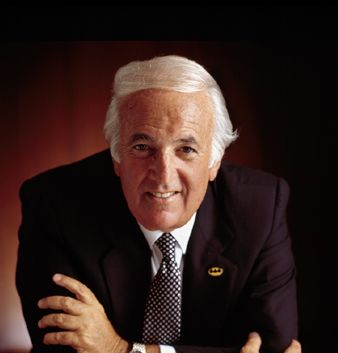Steven J. Ross (Steven J. Ross)

Businessman. He was the CEO of Time Warner Incorporated, Warner Communications, and Kinney National Services, Incorporated. Born Steven Jay Rechnitz in Brooklyn, New York, he was the son of Jewish immigrants. His father lost all his money during the Great Depression of the 1930s and changed the family name to Ross in hope of finding work with fewer struggles. After high school, he attended Paul Smith’s College in Paul Smiths, New York for two years and then joined the US Navy. Upon completing his military service, he went to work at his uncle’s store in the Garment District in Manhattan. After marrying the daughter of a Manhattan funeral home owner, where he accepted employment, he noticed that the limousines used in funeral processions were not being used at night. He convinced his father-in-law to let him establish a separate company that would lease out the vehicles in the evenings and it became instantly profitable. He then started his own rental company, Abbey Rent a Car, and later merged it with a parking lot operator, the Kinney Parking Company. He later added an office cleaning business and consolidated them into Kinney National Services. In 1966 Kinney expanded into the entertainment business by purchasing the Ashley-Famous talent agency and then in 1969, Kinney purchased the ailing Warner Brothers-Seven Arts film studio and record business. Two years later, after spinning off its non-entertainment assets, Kinney National Services renamed itself Warner Communications and he served as co-CEO from 1969 to 1972. In 1971 Warner expanded into the cable television business by purchasing various small cable companies, competing directly with the Big Three television networks who dominated television broadcasting, believing in the potential of narrowcasting whereby separate cable channels were developed to target specific audiences with narrower interests, mirroring the radio station model. This pioneering approach led to the creation of the successful cable television channels MTV and Nickelodeon. In 1972 he became CEO, president, and chairman of Warner Communications. In 1976 Warner Communications purchased Atari, Inc. and had great success with its Atari 2600 consoles. However, Atari collapsed in 1983, leaving Warner Communications vulnerable to a hostile takeover which was avoided when he 20 percent of Warner Communications to Chris-Craft Industries. In 1979 he partnered with American Express, convincing its executives on the potential of selling AmEx credit cards direct to Warner cable television customers. Warner-AmEx Cable was established and Warner received a much needed capital injection. AmEx’s cross-sale expectations never materialized and in 1984, Warner bought out American Express’s remaining share and the cable television business eventually became the cornerstone of the company until being spun-off of in 2009. In 1989 Warner Communications was merged with Time Incorporated in a $14 billion deal creating the largest media and entertainment company at the time, and within a year of the merger, he became the sole CEO. He also promoted and popularized soccer in the US, and was among the group of people that founded New York Cosmos in 1971. The club brought in soccer superstars Pelé and Franz Beckenbauer, as well as other prominent players such as Carlos Alberto, Vladislav Bogićević, Johan Neeskens, and Giorgio Chinaglia. In his final years, he suffered from prostate cancer and dies from complications associated with it in Los Angeles, California at the age of 65. (bio by: William Bjornstad)
Born
- September, 17, 1927
- USA
Died
- December, 12, 1992
- USA
Cemetery
- Green River Cemetery
- USA

